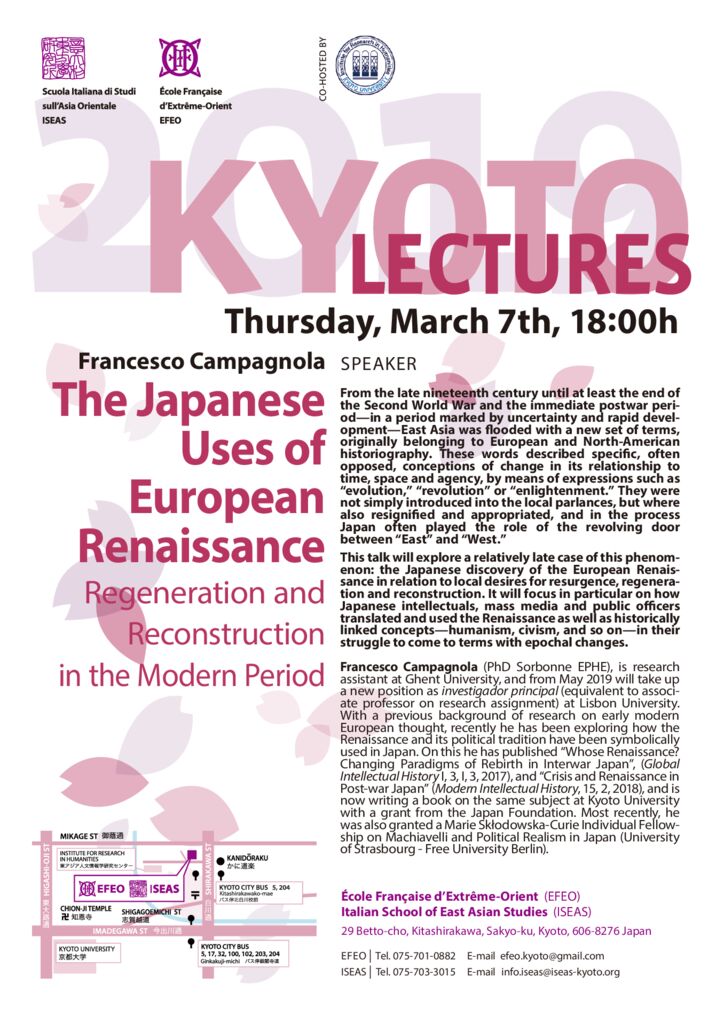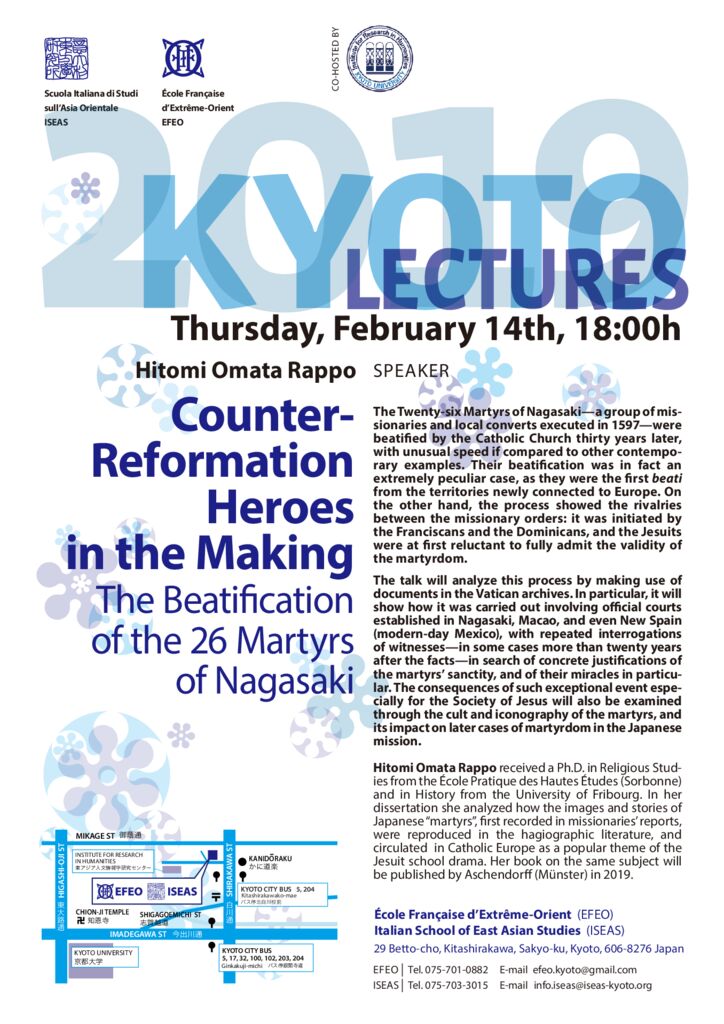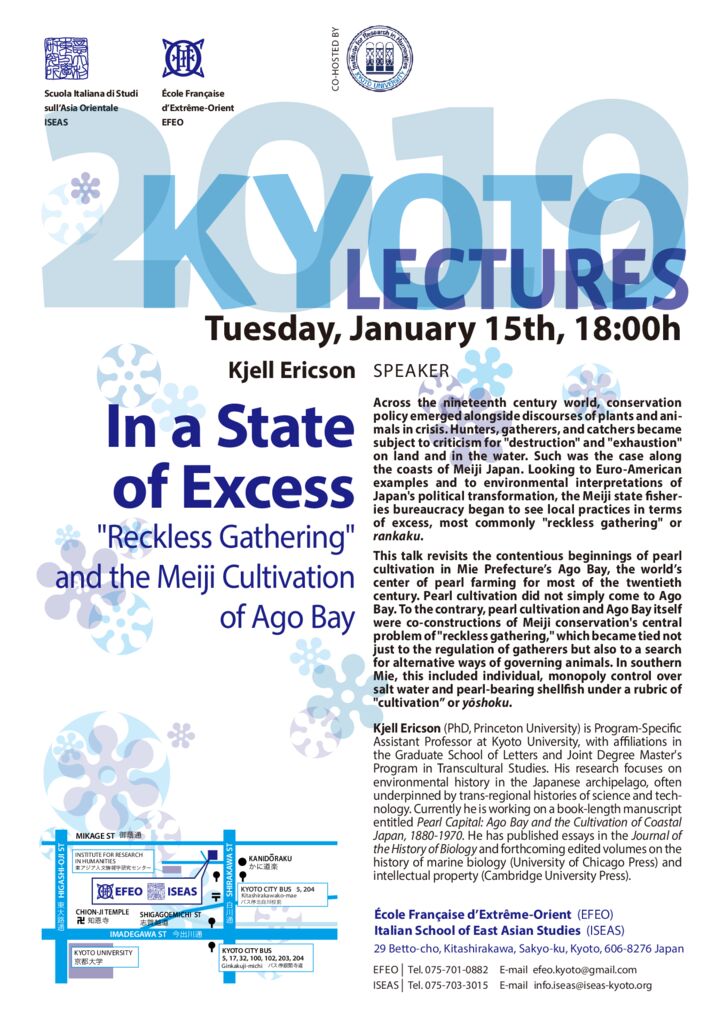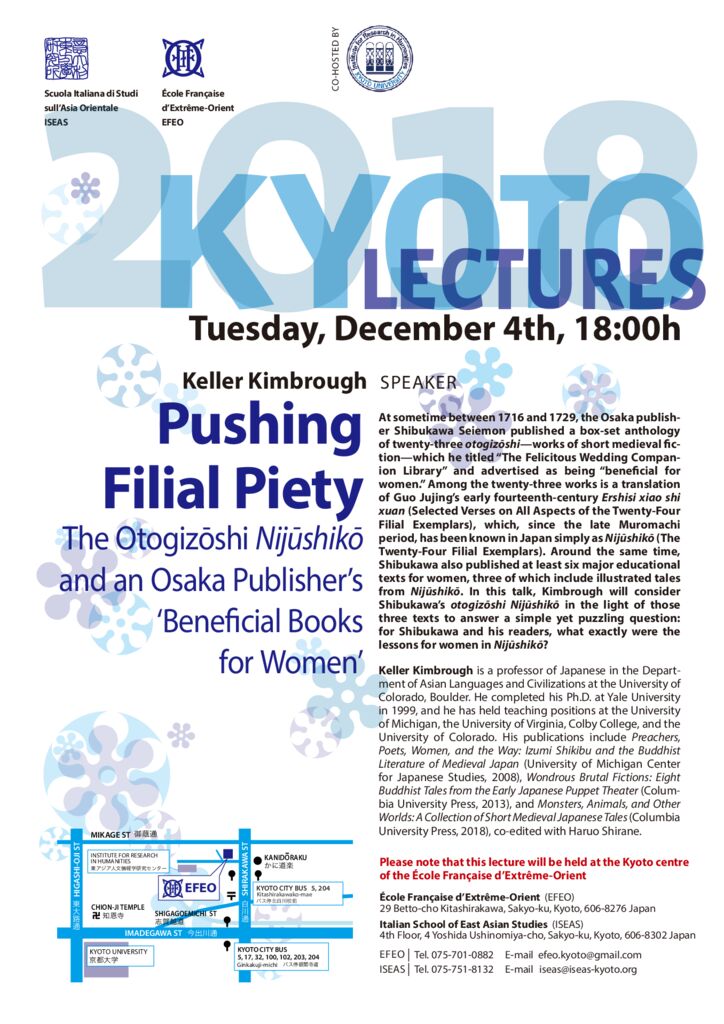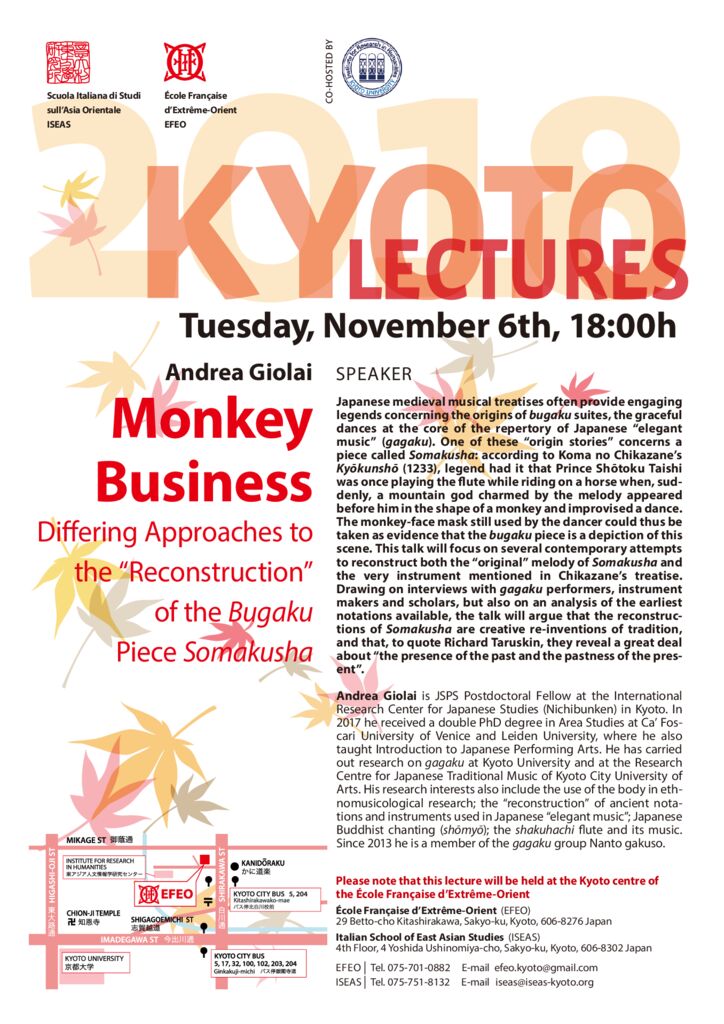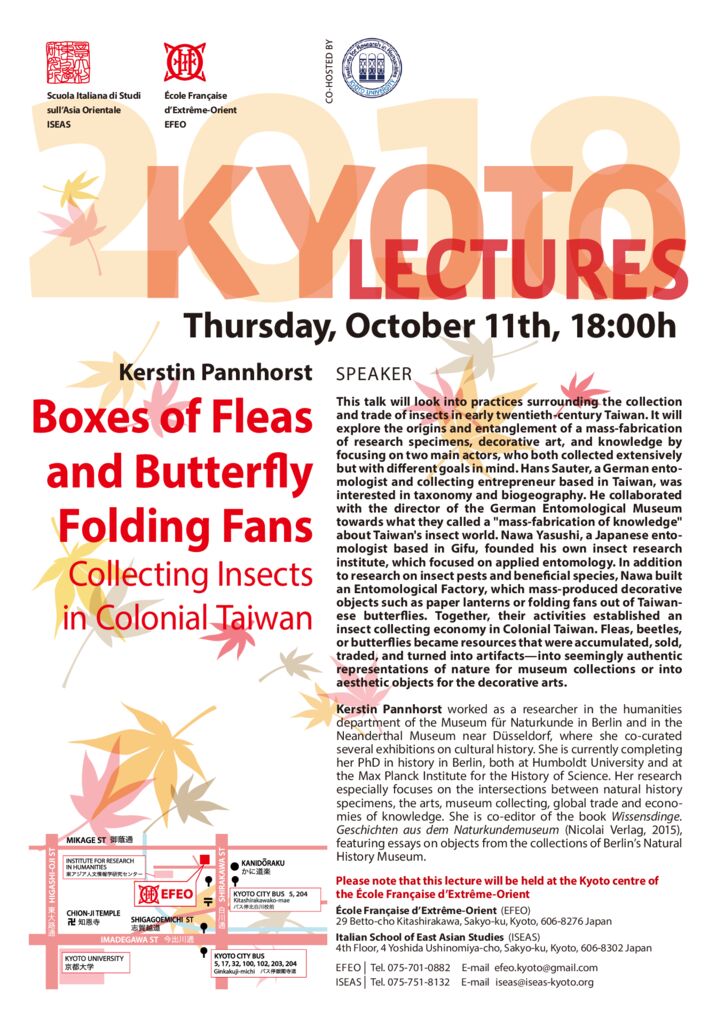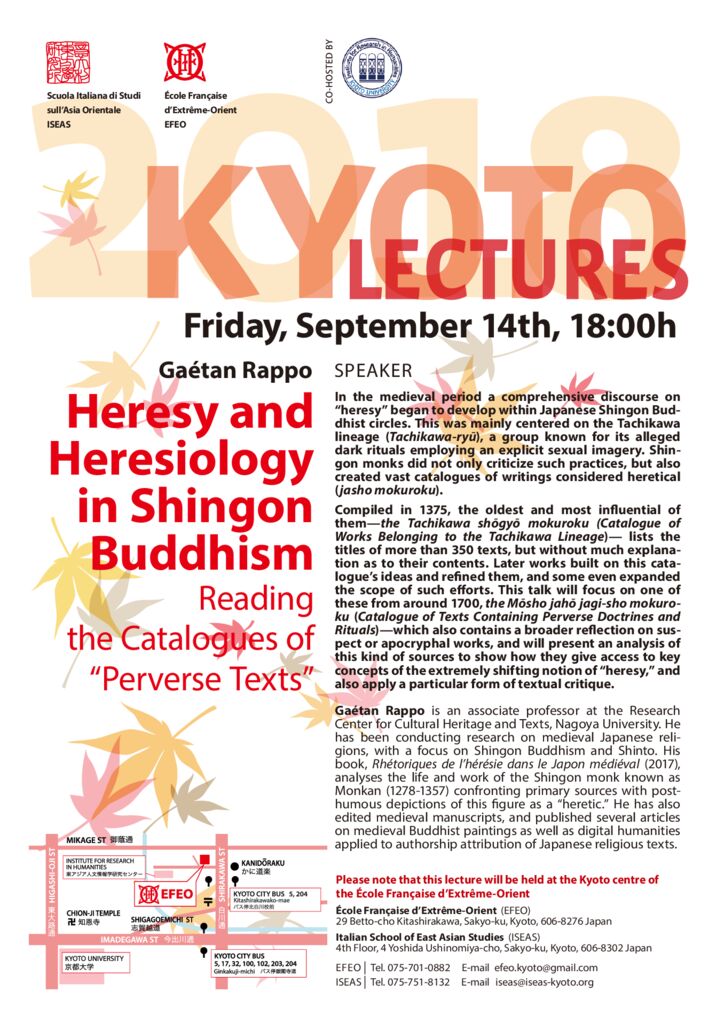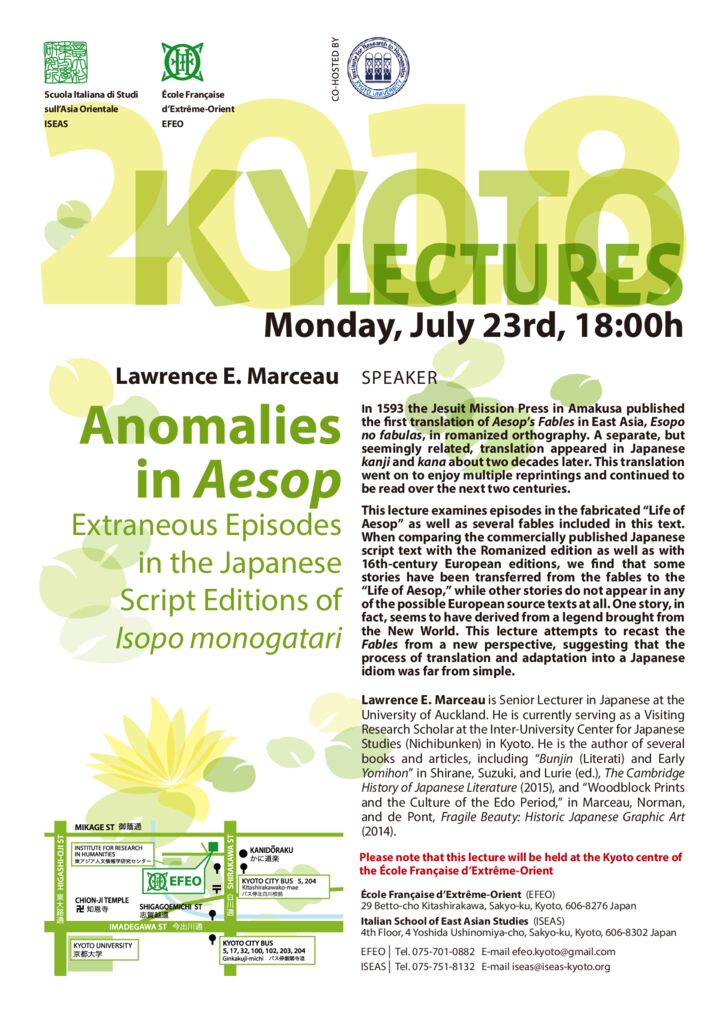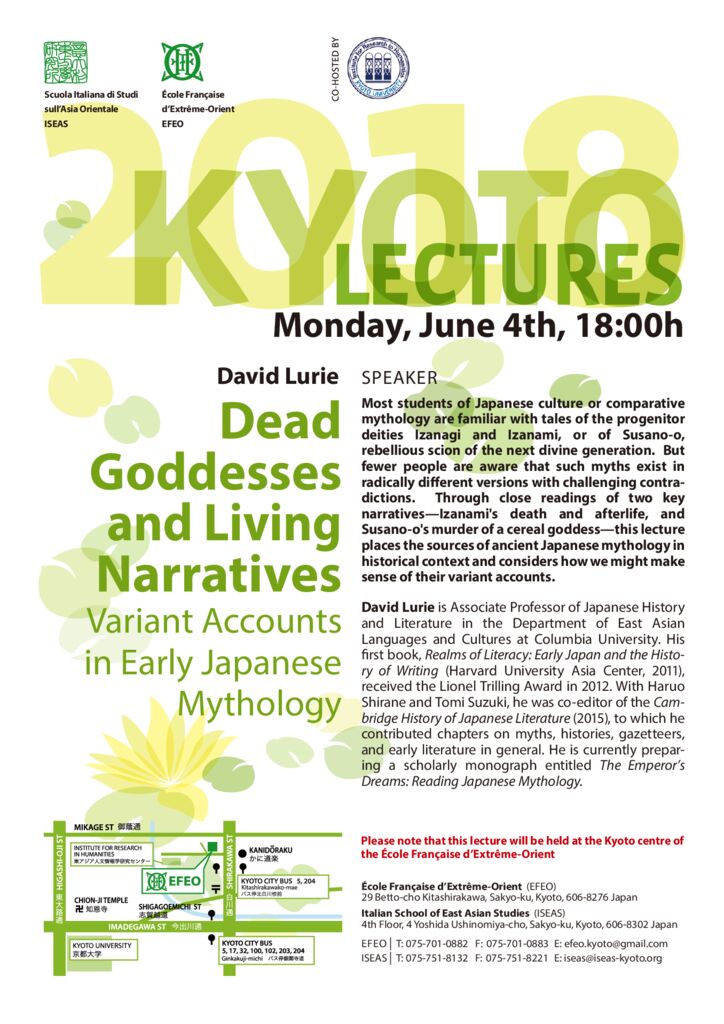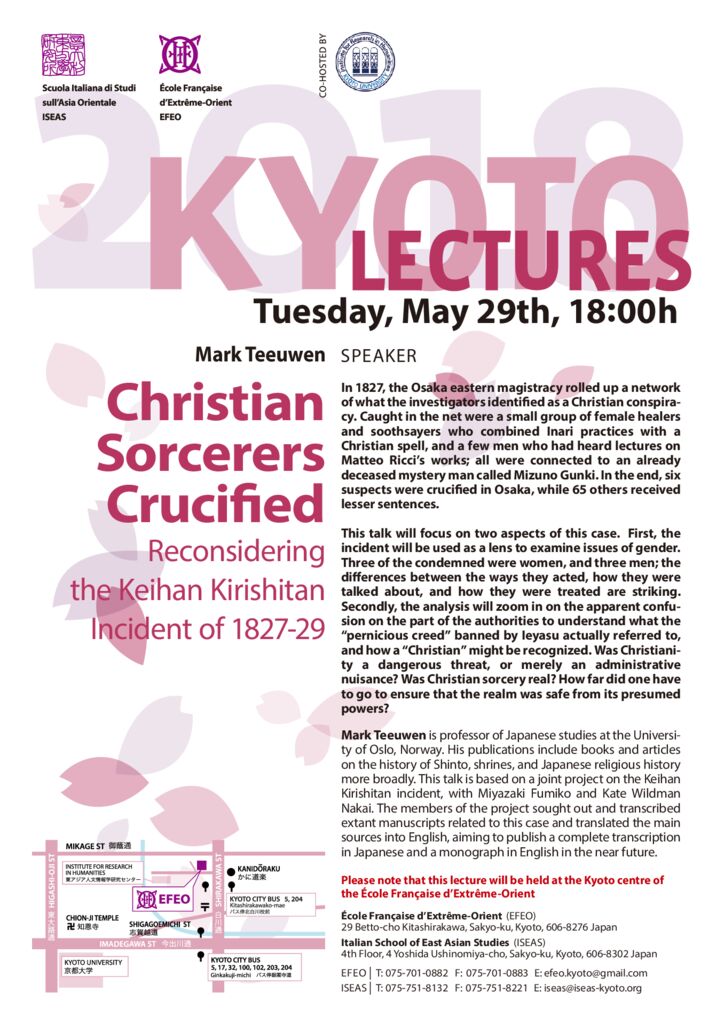Kyoto Lectures
The Japanese Uses of European Renaissance
Regeneration and Reconstruction in the Modern Period
Francesco Campagnola
March 7th, 2019 18:00
Italian School of East Asian Studies
From the late nineteenth century until at least the end of the Second World War and the immediate postwar period—in a period marked by uncertainty and rapid development—East Asia was flooded with a new set of terms, originally belonging to European and North-American historiography. These words described specific, often opposed, conceptions of change in its relationship to time, space and agency, by means of expressions such as “evolution,” “revolution” or “enlightenment.” They were not simply introduced into the local parlances, but were also resignified and appropriated, and in the process Japan often played the role of the revolving door between “East” and “West.”
This talk will explore a relatively late case of this phenomenon: the Japanese discovery of the European Renaissance in relation to local desires for resurgence, regeneration and reconstruction. It will focus in particular on how Japanese intellectuals, mass media and public officers translated and used the Renaissance as well as historically linked concepts—humanism, civism, and so on—in their struggle to come to terms with epochal changes.
Francesco Campagnola (PhD Sorbonne EPHE), is research assistant at Ghent University, and from May 2019 will take up a new position as investigador principal (equivalent to associate professor on research assignment) at Lisbon University. With a previous background of research on early modern Europeanthought, recently he has been exploring how the Renaissance and its political tradition have been symbolically used in Japan. On this he has published “Whose Renaissance? Changing Paradigms of Rebirth in Interwar Japan” (Global Intellectual History, 1, 3, 2017) and “Crisis and Renaissance in Post-war Japan” (Modern Intellectual History, 15, 2, 2018), and is now writing a book on the same subject at Kyoto University with a grant from the Japan Foundation. Mostrecently, he was also granted a Marie Skłodowska-Curie Individual Fellowship on Machiavelli and Political Realism in Japan (University of Strasbourg – Free University Berlin).
Kyoto Lectures
Counter-Reformation Heroes in the Making
The Beatification of the 26 Martyrs of Nagasaki
Hitomi Omata Rappo
February 14th, 2019 18:00
Italian School of East Asian Studies
The Twenty-six Martyrs of Nagasaki—a group of missionaries and local converts executed in 1597—were beatified by the Catholic Church thirty years later, with unusual speed if compared to other contemporary examples. Their beatification was in fact an extremely peculiar case, as they were the first beati from the territories newly connected to Europe. On the other hand, the process showed the rivalries between the missionary orders: it was initiated by the Franciscans and the Dominicans, and the Jesuits were at first reluctant to fully admit the validity of the martyrdom.
The talk will analyze this process by making use of documents in the Vatican archives. In particular, it will show how it was carried out involving official courts established in Nagasaki, Macao, and even New Spain (modern-day Mexico), with repeated interrogations of witnesses—in some cases more than twenty years after the facts—in search of concrete justifications of the martyrs’ sanctity, and of their miracles in particular. The consequences of such exceptional event especially for the Society of Jesus will also be examined through the cult and iconography of the martyrs, and its impact on later cases of martyrdom in the Japanese mission.
Hitomi Omata Rappo received a Ph.D. in Religious Studies from the École Pratique des Hautes Études (Sorbonne) and in History from the University of Fribourg. In her dissertation she analyzed how the images and stories of Japanese “martyrs”, first recorded in missionaries’ reports, were reproduced in the hagiographic literature, and circulated in Catholic Europe as a popular theme of the Jesuit school drama. Her book on the same subject will be published by Aschendorff (Münster) in 2019.
Kyoto Lectures
In a State of Excess
"Reckless Gathering" and the Meiji Cultivation of Ago Bay
Kjell Ericson
January 15th, 2019 18:00
École Francaise d’Extrême-Orient
Across the nineteenth century world, conservation policy emerged alongside discourses of plants and animals in crisis. Hunters, gatherers, and catchers became subject to criticism for “destruction” and “exhaustion” on land and in the water. Such was the case along the coasts of Meiji Japan. Looking to Euro-American examples and to environmental interpretations of Japan’s political transformation, the Meiji state fisheries bureaucracy began to see local practices in terms of excess, most commonly “reckless gathering” or rankaku.
This talk revisits the contentious beginnings of pearl cultivation in Mie Prefecture’s Ago Bay, the world’s center of pearl farming for most of the twentieth century. Pearl cultivation did not simply come to Ago Bay. To the contrary, pearl cultivation and Ago Bay itself were co-constructions of Meiji conservation’s central problem of “reckless gathering,” which became tied not just to the regulation of gatherers but also to a search for alternative ways of governing animals. In southern Mie, this included individual, monopoly control over salt water and pearl-bearing shellfish under a rubric of “cultivation” or yōshoku.
Kjell Ericson (PhD, Princeton University) is Program-Specific Assistant Professor at Kyoto University, with affiliations in the Graduate School of Letters and Joint Degree Master’s Program in Transcultural Studies. His research focuses on environmental history in the Japanese archipelago, often underpinned by trans-regional histories of science and technology. Currently he is working on a book-length manuscript entitled Pearl Capital: Ago Bay and the Cultivation of Coastal Japan, 1880-1970. He has published essays in the Journal of the History of Biology and forthcoming edited volumes on the history of marine biology (University of Chicago Press) and intellectual property (Cambridge University Press).
Kyoto Lectures
Pushing Filial Piety
The Otogizoshi Nijushiko and an Osaka Publisher’s ‘Benecial Books for Women’
Keller Kimbrough
December 4th, 2018 18:00
École française d'Extrême-Orient
At sometime between 1716 and 1729, the Osaka publisher Shibukawa Seiemon published a box-set anthology of twenty-three otogizôshi —works of short medieval fiction—which he titled “The Felicitous Wedding Companion Library” and advertised as being “beneficial for women.” Among the twenty-three works is a translation of Guo Jujing’s early fourteenth-century Ershisi xiao shi xuan (Selected Verses on All Aspects of the Twenty-Four Filial Exemplars), which, since the late Muromachi period, has been known in Japan simply as Nijûshikô (The Twenty-Four Filial Exemplars). Around the same time, Shibukawa also published at least six major educational texts for women, three of which include illustrated tales from Nijûshikô. In this talk, Kimbrough will consider Shibukawa’s otogizôshi Nijûshikô in the light of those three texts to answer a simple yet puzzling question: for Shibukawa and his readers, what exactly were the lessons for women in Nijûshikô ?
Keller Kimbrough is a professor of Japanese in the Department of Asian Languages and Civilizations at the University of Colorado, Boulder. He completed his Ph.D. at Yale University in 1999, and he has held teaching positions at the University of Michigan, the University of Virginia, Colby College, and the University of Colorado. His publications include Preachers, Poets, Women, and the Way: Izumi Shikibu and the Buddhist Literature of MedievalJapan (University of Michigan Center for Japanese Studies, 2008), Wondrous Brutal Fictions: Eight Buddhist Tales from the Early Japanese Puppet Theater (Columbia University Press, 2013), and Monsters, Animals, and Other Worlds: A Collection of Short Medieval Japanese Tales (ColumbiaUniversity Press, 2018), co-edited with Haruo Shirane.
Kyoto Lectures
Monkey Business
Differing Approaches to the “Reconstruction” of the Bugaku Piece Somakusha
Andrea Giolai
November 6th, 2018 18:00
École française d'Extrême-Orient
Japanese medieval musical treatises often provide engaging legends concerning the origins of bugaku suites, the graceful dances at the core of the repertory of Japanese “elegant music” (gagaku). One of these “origin stories” concerns a piece called Somakusha: according to Koma no Chikazane’s Kyōkunshō (1233), legend had it that Prince Shōtoku Taishi was once playing the flute while riding on a horse when, suddenly, a mountain god charmed by the melody appeared before him in the shape of a monkey and improvised a dance. The monkey-face mask still used by the dancer could thus be taken as evidence that the bugaku piece is a depiction of this scene. This talk will focus on several contemporary attempts to reconstruct both the “original” melody of Somakusha and the very instrument mentioned in Chikazane’s treatise. Drawing on interviews with gagaku performers, instrument makers and scholars, but also on my own analysis of the earliest notations available, the talk will argue that the reconstructions of Somakusha are creative re-inventions of tradition, and that, to quote Richard Taruskin, they reveal a great deal about “the presence of the past and the pastness of the present”.
Andrea Giolai is JSPS Postdoctoral Fellow at the International Research Center for Japanese Studies (Nichibunken) in Kyoto. In 2017 he received a double PhD degree in Area Studies at Ca’ Foscari University of Venice and Leiden University, where he also taught Introduction to Japanese Performing Arts. He has carried out research on gagaku at Kyoto University and at the Research Centre for Japanese Traditional Music of Kyoto City University of Arts. His research interests also include the use of the body in ethnomusicological research; the “reconstruction” of ancient notations and instruments used in Japanese “elegant music”; Japanese Buddhist chanting (shōmyō); the shakuhachi flute and its music. Since 2013 he is a member of the gagaku group Nanto gakuso.
Kyoto Lectures
Boxes of Fleas and Butter
Collecting Insects in Colonial Taiwan
Kerstin Pannhorst
October 11th, 2018 18:00
École française d'Extrême-Orient
This talk will look into practices surrounding the collection and trade of insects in early twentieth-century Taiwan. It will explore the origins and entanglement of a mass-fabrication of research specimens, decorative art, and knowledge by focusing on two main actors, who both collected extensively but with different goals in mind. Hans Sauter, a German entomologist and collecting entrepreneur based in Taiwan, was interested in taxonomy and biogeography. He collaborated with the director of the German Entomological Museum towards what they called a “mass-fabrication of knowledge” about Taiwan’s insect world. Nawa Yasushi, a Japanese entomologist based in Gifu, founded his own insect research institute, which focused on applied entomology. In addition to research on insect pests and beneficial species, Nawa built an Entomological Factory, which mass-produced decorative objects such as paper lanterns or folding fans out of Taiwanese butteries. Together, their activities established an insect collecting economy in Colonial Taiwan. Fleas, beetles, or butterflies became resources that were accumulated, sold, traded, and turned into artifacts—into seemingly authentic representations of nature for museum collections or into aesthetic objects for the decorative arts.
Kerstin Pannhorst worked as a researcher in the humanities department of the Museum für aturkunde in Berlin and in the Neanderthal Museum near Düsseldorf, where she co-curated several exhibitions on cultural history. She is currently completing her PhD in history in Berlin, both at Humboldt niversity and at the Max Planck Institute for the History of Science. Her research especially focuses on the intersections between natural history specimens, the arts, museum collecting, global trade and conomies of knowledge. She is co-editor of the book Wissensdinge. Geschichten aus dem aturkundemuseum (Nicolai Verlag, 2015), featuring essays on objects from the collections of Berlin’s Natural History Museum.
Kyoto Lectures
Heresy and Heresiology in Shingon Buddhism
Reading the Catalogues of “Perverse Texts”
Gaétan Rappo
September 14th, 2018 18:00
École française d'Extrême-Orient
In the medieval period a comprehensive discourse on “heresy” began to develop within Japanese Shingon Buddhist circles. This was mainly centered on the Tachikawa lineage (Tachikawa-ryu), a group known for its alleged dark rituals employing an explicit sexual imagery. Shingon monks did not only criticize such practices, but also created vast catalogues of writings considered heretical (jasho mokuroku).
Compiled in 1375, the oldest and most inuential of them—the Tachikawa shogyo mokuroku (Catalogue of Works Belonging to the Tachikawa Lineage)— lists the titles of more than 350 texts, but without much explanation as to their contents. Later works built on this catalogue’s ideas and rened them, and some even expanded the scope of such eorts. This talk will focus on one of these from around 1700, the Mosho jaho jagi-sho mokuroku (Catalogue of Texts Containing Perverse Doctrines and Rituals)—which also contains a broader reection on suspect or apocryphal works, and will present an analysis of this kind of sources to show how they give access to key concepts of the extremely shifting notion of “heresy,” and also apply a particular form of textual critique.
Gaétan Rappo is an associate professor at the Research Center for Cultural Heritage and Texts, Nagoya University. He has been conducting research on medieval Japanese religions, with a focus on Shingon Buddhism and Shinto. His book, Rhétoriques de l’hérésie dans le Japon médiéval (2017), analyses the life and work of the Shingon monk known as Monkan (1278-1357) confronting primary sources with posthumous depictions of this gure as a “heretic.” He has also edited medieval manuscripts, and published several articles on medieval Buddhist paintings as well as digital humanities applied to authorship attribution of Japanese religious texts.
Kyoto Lectures
Anomalies in Aesop
Extraneous Episodes in the Japanese Script Editions of Isopo monogatari
Lawrence E. Marceau
July 23rd, 2018 18:00
École française d'Extrême-Orient
In 1593 the Jesuit Mission Press in Amakusa published the first translation of Aesop’s Fables in East Asia, Esopo no fabulas, in romanized orthography. A separate, but seemingly related, translation appeared in Japanese kanji and kana about two decades later. This translation went on to enjoy multiple reprintings and continued to be read over the next two centuries.
This lecture examines episodes in the fabricated “Life of Aesop” as well as several fables included in this text. When comparing the commercially published Japanese script text with the Romanized edition as well as with 16th-century European editions, we find that some stories have been transferred from the fables to the “Life of Aesop,” while other stories do not appear in any of the possible European source texts at all. One story, in fact, seems to have derived from a legend brought from the New World. This lecture attempts to recast the Fables from a new perspective, suggesting that the process of translation and adaptation into a Japanese idiom was far from simple.
Lawrence E. Marceau is Senior Lecturer in Japanese at the University of Auckland. He is currently serving as a Visiting Research Scholar at the Inter-University Center for Japanese Studies (Nichibunken) in Kyoto. He is the author of several books and articles, including recently “Bunjin (Literati) and Early Yomihon” in Shirane, Suzuki, and Lurie (ed.), The Cambridge History of Japanese Literature (2015), and “Woodblock Prints and the Culture of the Edo Period,” in Marceau, Norman, and de Pont, Fragile Beauty: Historic Japanese Graphic Art (2014).
Kyoto Lectures
Dead Goddesses and Living Narratives
Variant Accounts in Early Japanese Mythology
David Lurie
June 4th, 2018 18:00
École française d'Extrême-Orient
In 1593 the Jesuit Mission Press in Amakusa published the first translation of Aesop’s Fables in East Asia, Esopo no fabulas, in romanized orthography. A separate, but seemingly related, translation appeared in Japanese kanji and kana about two decades later. This translation went on to enjoy multiple reprintings and continued to be read over the next two centuries.
This lecture examines episodes in the fabricated “Life of Aesop” as well as several fables included in this text. When comparing the commercially published Japanese script text with the Romanized edition as well as with 16th-century European editions, we find that some stories have been transferred from the fables to the “Life of Aesop,” while other stories do not appear in any of the possible European source texts at all. One story, in fact, seems to have derived from a legend brought from the New World. This lecture attempts to recast the Fables from a new perspective, suggesting that the process of translation and adaptation into a Japanese idiom was far from simple.
Lawrence E. Marceau is Senior Lecturer in Japanese at the University of Auckland. He is currently serving as a Visiting Research Scholar at the Inter-University Center for Japanese Studies (Nichibunken) in Kyoto. He is the author of several books and articles, including recently “Bunjin (Literati) and Early Yomihon” in Shirane, Suzuki, and Lurie (ed.), The Cambridge History of Japanese Literature (2015), and “Woodblock Prints and the Culture of the Edo Period,” in Marceau, Norman, and de Pont, Fragile Beauty: Historic Japanese Graphic Art (2014).
Kyoto Lectures
Christian Sorcerers Crucified
Reconsidering the Keihan Kirishitan lncident of 1827~29
Mark Teeuwen
May 29th, 2018 18:00
École française d'Extrême-Orient
In 1827, the Osaka eastern magistracy rolled up a network of what the investigators identified as a Christian conspiracy. Caught in the net were a small group of female healers and soothsayers who combined Inari practices with a Christian spell, and a few men who had heard lectures on Matteo Ricci’s works; all were connected to an already deceased mystery man called Mizuno Gunki. In the end, six suspects were crucified in Osaka, while 65 others received lesser sentences.
This talk will focus on two aspects of this case. First, the incident will be used as a lens to examine issues of gender. Three of the condemned were women, and three men; the differences between the ways they acted, how they were talked about, and how they were treated are striking. Secondly, the analysis will zoom in on the apparent confusion on the part of the authorities to understand what the “pernicious creed” banned by Ieyasu actually referred to, and how a “Christian” might be recognized. Was Christianity a dangerous threat, or merely an administrative nuisance? Was Christian sorcery real? How far did one have to go to ensure that the realm was safe from its presumed powers?
Mark Teeuwen is professor of Japanese studies at the University of Oslo, Norway. His publications include books and articles on the history of Shinto, shrines, and Japanese religious history more broadly. This talk is based on a joint project on the Keihan Kirishitan incident, with Miyazaki Fumiko and Kate Wildman Nakai. The members of the project sought out and transcribed extant manuscripts related to this case and translated the main sources into English, aiming to publish a complete transcription in Japanese and a monograph in English in the near future.
